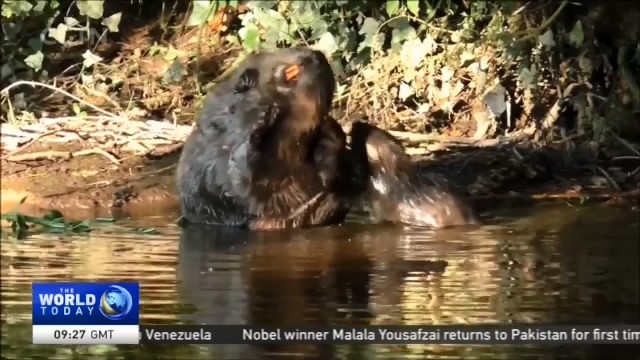
18:31, 29-Mar-2018
Europe Rewilding: Beavers making comeback in England

As we continue our series on rewilding projects in Europe, CGTN's Kate Parkinson takes a look at the reintroduction of beavers in England.
KATE PARKINSON DEVON, ENGLAND STANDUP "Beavers haven't been seen in the United Kingdom for over four hundred years. They were once widespread but were hunted to extinction - for their fur, their meat and their powerful scent glands which were used in medicines and perfumes. But beavers are making a come back."
In 2011 a pair of beavers were released into an enclosed patch of woodland as part of a project run by Devon Wildlife Trust to see what impact they had on the environment.
Mark Elliot, who is leading the project, says over the past six years the beavers have transformed a little trickle of a stream into a remarkable wetland and are proving that the environmental engineers could be used as a natural flood defence.
MARK ELLIOT DEVON WILDLIFE TRUST BEAVER PROJECT "They've dramatically engineered this watercourse so we've now got a sequence of 13 dams. And they are storing huge amounts of water so we've got about a million litres of water being stored above ground in each of these ponds. What we are seeing here is that the amount of flood water that's coming in at the top of the site, by the time that flood water has reached the bottom of the site there is a much lower level of water so it could potentially save people downstream from flooding. If we had these beaver dams throughout the top of a river catchment, the overall affect of the amount of water reaching homes in the floodplain downstream really could be dramatic."
Kate: "Are we going to see any beavers today Mark?"
Mark: "No, we don't see beavers at this time of year really, they're nocturnal. But you can see signs easily enough. This is a beaver dam here, and a beaver stick. So this is what they are feeding on at the moment, you can see the teeth marks there."
Kate: "Oh wow, yes."
Mark: "And they've stripped off all this bark from here. And this I willow, they are taking willow from here so. There's a regular feeding sign here, and these are really clear teeth marks on this one."
Two years after the Devon Wildlife Trust launched their beaver project at the enclosed site, something rather unexpected happened which significantly expanded the scope of their study. VO
On the banks of the River Otter, retired environmental scientist, Tom Buckley, spotted a beaver living freely in the wild.
TOM BUCKLEY RETIRED ENVIRONMENTAL SCIENTIST "What a surprise, I couldn't believe it. I was almost speechless, there was a beaver."
Tom set up cameras along the river and has captured the most extraordinary footage of what is thought to be England's only wild colony of beavers.
No one knows exactly where the beavers came from - they may have escaped from captivity, or been released illegally.
Either way, the British government did not share Tom's excitement.
TOM BUCKLEY RETIRED ENVIRONMENTAL SCIENTIST "The government's immediate reaction to hearing about them was that they were going to catch them and to actually put them somewhere in captivity. And I was a little bit taken aback by that, I saw it completely differently. My view was that we have a unique opportunity here. We've got wild beavers in our river and we've got the opportunity to monitor and assess them and actually then to use that information to inform future decisions about wild beavers in Britain."
His stance seemed to chime with local people who launched a "Save Our Beavers" campaign.
Eventually the government declared the beavers could stay and granted Devon Wildlife Trust a five year licence to study the impact they have on the environment.
The wild beavers are thriving — there are thought to be around 27 now living along the river.
And after the initial lukewarm reception, the beavers seem to be winning over authorities and plans have been approved to release more beavers into the wild this spring. Kate Parkinson, CGTN, Devon.

SITEMAP
Copyright © 2018 CGTN. Beijing ICP prepared NO.16065310-3
Copyright © 2018 CGTN. Beijing ICP prepared NO.16065310-3